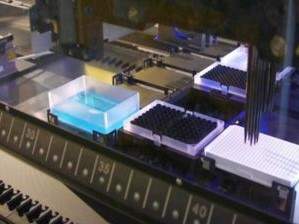
The UK Government has revealed plans to build a fully automated facility at the Rosalind Franklin Institute in Oxfordshire to enable fast, effective and hands-free molecular discovery for new medicines.
Business Secretary Greg Clark has launched the new £103m institute, which will carry out a series of projects to develop new drug discovery technologies and accelerate medicine research.

Discover B2B Marketing That Performs
Combine business intelligence and editorial excellence to reach engaged professionals across 36 leading media platforms.
One of the new projects is called Closing the Loop on Drug Discovery and it will work towards a range of technologies for driving discovery of quality lead molecules to minimise the costs associated with the discovery process.
For the project, companies, small and medium sized enterprises, universities and the Medicines Discovery Catapult will partner to conduct research and development of the new technology.
The Rosalind Franklin Institute will work with 11 collaborators, including the University of Leeds, across life sciences, physical sciences and engineering areas.
The primary goal of the new facility is to provide a rapid alternative for existing costly processes that usually require more than ten years to discover a new drug.

US Tariffs are shifting - will you react or anticipate?
Don’t let policy changes catch you off guard. Stay proactive with real-time data and expert analysis.
By GlobalDataIt will see 150 researchers leverage a variety of systems such as artificial intelligence (AI) and robotics to develop new diagnostics, drugs and treatments.
Furthermore, the facility will feature new instruments to facilitate direct observation of interactions between drug candidates and target proteins.
University of Leeds lead scientist Adam Nelson said: “This won’t be a traditional chemistry lab. It will use robotics and AI to automate the discovery process. It will allow hundreds or thousands of candidate molecules to be investigated at a time, and we aim to increase productivity by five to ten times.
“But faster processing isn’t enough. We also want to find higher-quality starting points for drug discovery to maximise the chances of success at later stages in the pipeline.
“This will enable the UK to remain globally competitive in bringing new drugs to the market that can meet the needs of patients.”




